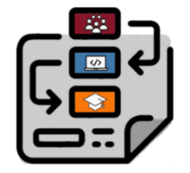(View Complete Item Description)
In this professional development presentation, educators learn about Algorithms (1 of the 7 components of Computational Thinking, according the Ignite My Future platform). This presentation can be used by individuals to learn about them, or used to present to others. The video is a recording of one of the sessions provided to teachers through a 7 week series of "CT Parties".Within this resource, you will find the presentation slides, a recording, a K-2 and 3-5 lesson to develop an understanding of algorithms, and activities to support parents understanding and home use of the strategy. This lesson is part of the Virginia K-12 Computer Science Pipeline which is partly funded through a GO Virginia grant in partnership with Chesapeake Public Schools, Loudoun County Public Schools, and the Loudoun Education Foundation.
Material Type:
Lesson
Authors:
Rebecca Gratz,
Shawn DeLuca






